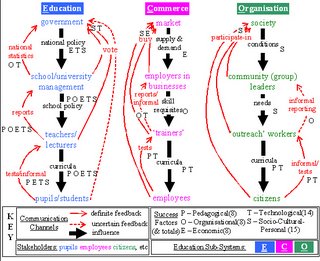21 Thoughts on the 21st Century.
Hi!
This summary is based on a post I made yesterday to the DESD list where I studied participants recent contributions (including the conveners' summary) and a few associated documents then added my own thoughts. I look forward to any comments you may have. Regards, Tim :-)
1. DESD should address all forms of education (“formal, non-formal, informal”) although this needs deconstructing
2. need SD of ESD (for future generations to ‘carry the torch’)
3. self-organisation fosters local knowledge, e.g. ‘indigenous’ cultures (e.g. S. Pacific ‘spiritual’ aspect of knowledge)
4. SD should demonstrate changes in behaviour therefore ESD also should
5. ESD needs to encourage changes in attitudes, values, belief systems, etc.
6. may be useful to highlight differences between “competitive” societies and “ESD societies” [not my idea]
7. both quantitative and qualitative indicators should be used
8. ideas concerning ESD ‘process’ should not be over-prescriptive so as not to stifle self-organisation
9. internationally comparative indicators are difficult due to variability of contexts, etc.
10. however, ‘universal’ indicators may emerge from an overview of context-specific ones (hypothesis)
11. ESD varies as much as SD between contexts (e.g. due to differences in cultures, available technologies, political situations, availability of teachers, school, books, etc.)
12. self-evaluation may encourage self-organisation as its in-keeping [self-evaluation being another participant’s idea]
13. there’s no need to re-invent the wheel, e.g. if sufficient quality assurance systems exist there’s no need for extra ESD ones (instead look at embedding SD in the curricula?) [reiterated by another participant]
14. its difficult to isolate the ESD ‘variables’ in the measurement of changes of values, e.g. they could be a consequence of economic incentives (competitiveness) or politics (vote-winners)
15. ESD is complex
16. measuring education is not synonymous with measuring ESD [not my point]
17. differences in culture make any comparisons difficult (e.g. differing ideas of knowledge or pedagogical approach – instructivist or constructivist?)
18. Draft International Implementation Scheme (IIS) Section 3, Sub-section 9, Table 8 contains 9 expected outcomes of DESD & “potential indicators” and “data for use in verification” although they seem high-level/top-down [it seems a “shortened” version was finally approved, maybe we can revisit the draft version in a future post]
19. UNU Regional Centres of Expertise may make good case studies
20. There are lots of issues to consider (e.g. Education for All, Gender Equality, use of ICTs, etc.) and lots of complex, interconnected systems (e.g. Government, ecological, economic, etc.)
21. Its appropriate that we have at least a decade to tackle all this!


